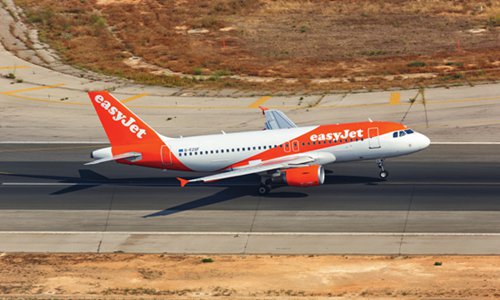HOME >> BUSINESS
EasyJet finds budget solution despite aviation being put in green movement’s ‘crosshairs’
Source:Global Times Published: 2019/11/24 18:38:40

An easyJet plane takes off at Palma de Mallorca, Spain. Photo: IC
EasyJet has discovered a low-cost way to offset Greta Thunberg. The Swedish environmental activist is trying to make flying shameful. Now the British budget carrier will spend 25 million pounds ($32.4 million) a year to compensate for its carbon dioxide emissions. That's less green than it sounds.Thunberg's campaigning, including sailing across the Atlantic, has put aviation in the green movement's crosshairs. Although the industry produces less than 3 percent of global emissions, that proportion will rise as more people fly and other sectors switch from fossil fuels to renewable energy.
Airlines like to trumpet their environmental credentials by measuring emissions for every kilometer a passenger spends in the air. By that yardstick, easyJet is 34 percent greener than it was two decades ago. Most of those gains have come from new planes that burn less fuel. As kerosene accounts for a third of airline costs, that's great for the bottom line. But with passenger numbers rising - easyJet carried 8.6 percent more people this year to September - it's not so great for the climate.
EasyJet Chief Executive Johan Lundgren, another Swede, is taking more than token action. The 25 million pounds he has committed to spend on carbon offset schemes is equivalent to 6 percent of easyJet's pre-tax profit in the last financial year. Passengers at rival Ryanair have voluntarily handed over just 2.5 million euros ($2.77 million) to compensate for emissions since 2018, a miniscule portion of the Irish carrier's 15 billion euros of revenue over the same period.
But Lundgren's plan is hardly a solution. Given annual emissions of 8.5 million tons, easyJet is paying just 2.90 pounds per ton of CO2 it emits. That's just 14 percent of the European traded carbon price of 23.4 euros per ton, which environmentalists say is far too low. At just 25 pence per ticket, passengers wouldn't notice even if easyJet passed on the cost.
The benefits of offset projects, even audited schemes like the ones easyJet is supporting, are also disputed. The funds may go towards a scheme - an African solar panel park, say - that would have been built anyway. New trees may not grow as high or as quickly as promised. Thunberg can take heart that her "flight shaming" message has forced airlines to take notice. But offsetting guilt remains a budget option.
The author is Ed Cropley, Reuters Breakingviews columnist. The article was first published on Reuters Breakingviews. bizopinion@globaltimes.com.cn
Posted in: INSIDER'S EYE